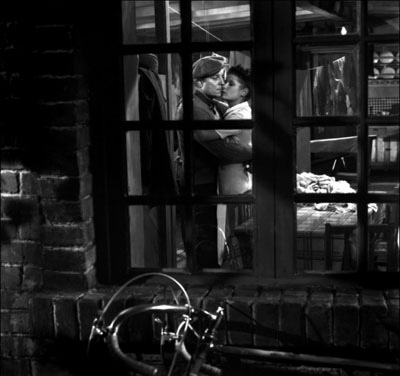“It’s one thing to watch sturdy, dexterously charming Jean Gabin as a working-class joe who doesn’t mind dangerous manual labor, figuring that’s his lot in life,” begins Stephanie Zacharek in the Voice. “But to see him as a man undone by his love for a noncommittal woman? That’s nearly unbearable, and it’s the linchpin of Marcel Carné‘s extraordinary, long-unseen 1939 crime drama Le jour se lève (Daybreak), playing at Film Forum in a glistening restoration that includes footage removed by Vichy censors 75 years ago.”
“Le jour se lève typically gets shoehorned, along with a handful of other collaborations between director Marcel Carné and screenwriter Jacques Prévert, into a filmic historical movement known by the oxymoronic catchall ‘poetic realism,'” writes Budd Wilkins for Slant. “But, in many ways, it’s more productive to view this relentlessly dour and disillusioned masterwork as a feel-bad forerunner of film noir…. Prévert was an active associate of the surrealist movement, as were many of the postwar critics instrumental in delineating the contours of film noir as an aesthetic, so the similarities in tone and technique between Le jour se lève and what critics prized most in classical noir might best be put down to an elective affinity of sensibilities.”
Anna King in Time Out New York: “The film tracks the inevitable unraveling of factory worker François (Jean Gabin) after he kills the absurd vaudeville entertainer Valentin (Jules Berry), his romantic rival for the affections of Françoise (Jacqueline Laurent) and Clara (Arletty). A series of three flashbacks illuminate the events that precede Valentin’s death, as the police slowly close in on François, cornered and chain-smoking. Following on the heels of the recent restoration of Carné’s epic Children of Paradise, the final result is masterful, leaving only a couple of scenes lingering in slightly fuzzy focus.”
The new restoration screened in the UK last month and the Guardian‘s Peter Bradshaw found it “bristling with energy and shaped with incomparable artistry and flair.” On the other hand, David Jenkins at Little White Lies: “Despite a certain thematic richness and its status as an important antecedent to the ascendant noir genre in the US (this smacks heavily of the kind of film Fritz Lang was making after his move to Hollywood), it perhaps doesn’t stand up as one of the classics of the era.”
Update, 11/14: “Blending romantic despair with violent moods, theatrical volubility with oppressive silence, the movie captures a society of contradictions at a tragic breaking point,” writes the New Yorker‘s Richard Brody. “When François, besieged by armed officers, screams, ‘I want peace! Peace!,’ he seems to speak for a panic-stricken nation.”
For news and tips throughout the day every day, follow @KeyframeDaily. Get Keyframe Daily in your inbox by signing in at fandor.com/daily.




